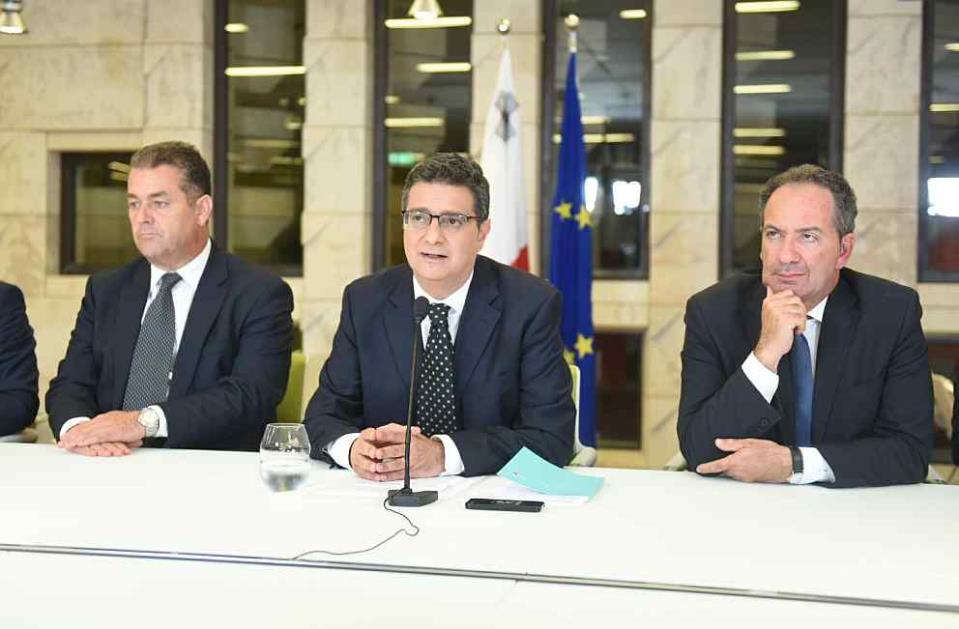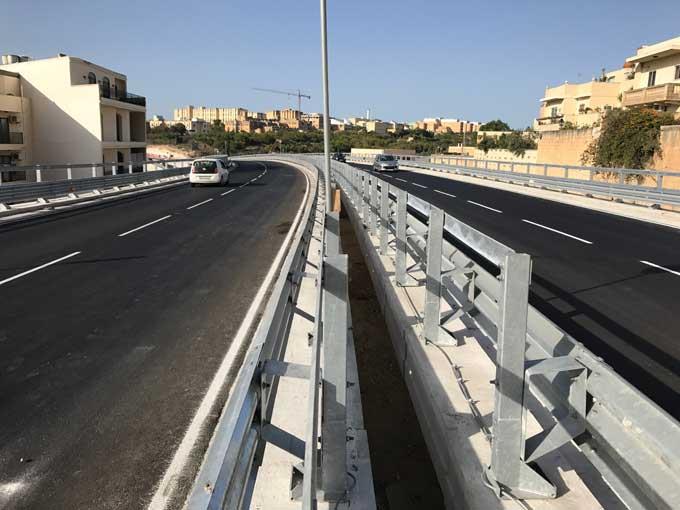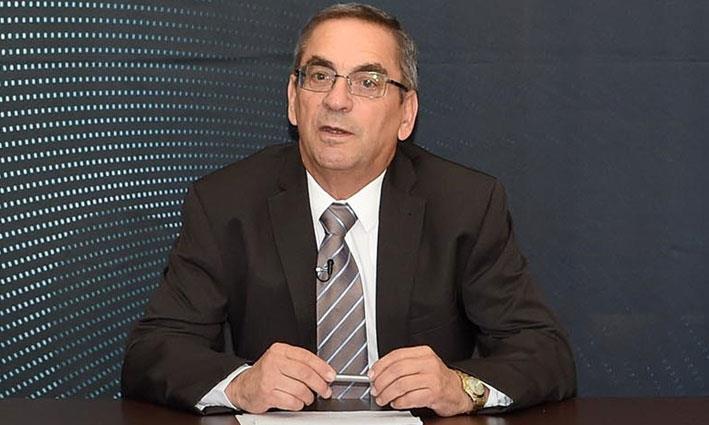A highlight of Budget 2018 was the €700 million road project scheduled for 2019. Why is a separate agency outside of Transport Malta being created?
The proposal is directly lifted from the party’s electoral manifesto. The agency, which will undertake a year of planning before beginning the seven-year project, will work outside of Transport Malta (TM) but will work closely with the organisation. I think people don’t just want to see roads constructed, they want to see a genuine change in the way things are done.
The agency will make use of the most experienced members of TM, specifically those who work in the Roads Department and who worked on the Kappara project.
We are currently working with the Ministry’s legal service on the specifics of its creation, not just in terms of actual projects, but also in terms of human resources.

Opposition leader Adrian Delia has criticised the creation of the agency, saying that he expected the government to already have a plan in place when it included the proposal in its electoral manifesto. Would you like to comment?
Delia also said in his speech on Independence Day that there was no need to invest in the country’s roads because there are no potholes. The electoral pledge always said that the government would create an agency for this project.
I feel people are desperate to see a change in the way we tackle the road network. Do people want the roads to be constructed in the same way? The same traffic management? The same coordination or rather the lack of it between entities?
Back in the 1990s, the management and maintenance of residential roads were devolved from the central government to local councils, and we are taking that power back. Local councils’ budget will also not be affected, and will free up funds for other projects.
On what criteria is the work going to be based?
While many local councils have done good work on the roads in their community, there are a number of those who did not. Over the next year, we need to take stock of the current situation of the roads. We will be inspecting every road to see what work needs to be done and we will prioritise them; first the roads that were never constructed, then the most damaged ones, and so on.

The Kappara Junction is almost ready and should be completed by the end of this year, and I think the general perception out there is that the people were happy with the general planning of the project. However, the Marsa multi-level junction presents quite a different challenge given the sheer amount of vehicles that use that road daily. How do you plan to cater for them? Do we have a start date and an expected completion date?
It is a bigger challenge, especially now that expectations are higher after the good work done on the Kappara fly-over. The Marsa project will take three years and will start at the beginning of next year. It will be done in phases, with the first being the demolition of some factories in the surrounding area then to the roads on street level, and finally the multi-level flyovers.
Last week, we also issued the tender for the second phase and the tender for the third phase. We wanted to conduct the work in parallel, to avoid a long time for procurement and have the public see the development progress. I am optimistic that everything will run smoothly.
The traffic management officials, who worked on Kappara, are also in the final stages of their technical report for this project.
If we can start before January, we will.

Your predecessor, Minister Joe Mizzi, said that traffic is a perception. Do you agree?
I, like all other commuters, am constantly frustrated when I am in a traffic jam or slow moving traffic but this is a challenge presented by economic development, with more people buying cars, commuting to work, and even the influx of foreign workers.
The challenge is so big that I feel we need to take long-, medium-, and short-term measures. Pursuing only one of these paths has its drawbacks; whenever you adopt long-term solutions, people complain because the project would take 20 years; and whenever you go for a short-term solution, people accuse you of not seeing the bigger picture.
I think we are delivering by finding a balance between the two. This year we announced that we are conducting 25 interventions in critical nodes in the Maltese road network, which we believe will alleviate traffic congestion. We are also providing free public transport for 16- to 20-year-olds, which could hopefully help people shift to alternative modes of transport. The ‘free school transport for all students’ initiative will also have a positive impact on traffic, given that a large number of parents use private cars to take their children to school.
However, we are also implementing measures to help reduce the pollution generated by cars by providing incentives for motorcycles, bicycles and electric bicycles, as well as hybrid and electric cars being exempt from registration tax and their road licence for the first five years.

I think it is fair to say that the reality is that with over 360,000 cars, traffic and congestion has become a common feature throughout the year, even during the summer months. Do you not agree that fixing roads is only a short-term solution?
I agree with you, we are looking to improve the infrastructure, but really you are only gaining time. In fact, the manifesto clearly states that the government needs to make advancements in mass rapid transport. I do feel however that the Marsa Junction, and other projects in areas like Attard, Buqana, Santa Lucija, and Mistra Road, will help substantially.
At the seminar on the Future on Auto-mobility and Traffic Plans, you said that plans for a rapid mass transport system were well underway. Can you elaborate?
Transport Malta is conducting studies at the moment and different options are being considered; in fact, a rapid mass transport system was part of our national transport strategy approved by the European Commission. However, we definitely need to find an alternative mode of public transport.
The metro plan proposed by Simon Busuttil was a 20-year project, and I think the public wants to see solutions sooner, so it is important that whatever is chosen is completed within 10 to 15 years of its start date.
I would like to say that we are trying to create a shift to alternative modes of public transport by focusing on the ferry service, which had about a million commuters last year, and it looks like it will exceed that threshold this year. The ferry-tunnel project linking Birgu/SmartCity and Sliema will begin soon, and the manifesto also mentions creating links with St Paul’s Bay and other areas in the south of Malta.
There is, however, a cultural question that needs to be addressed. Maltese find it quite hard to change their mentality. As it stands, we do eight errands on eight different journeys, instead of planning a single route.
Politicians have tough decisions to make because we do not want to limit people’s choices, yet with the growing number of cars, which stands at roughly 360,000, we need to start examining how people will make the switch voluntarily.

The school transport initiative was also announced in the budget. Could you provide specifics how this will work? Do you envisage a service where different schools are on the same bus?
The lead ministry for the phase of consultation is the Ministry for Education, but what I can tell you is that we are not looking to reinvent the wheel, as the service is already running today. We are just looking for concrete measures that will see those children who go to school in private cars begin to use school transport.
Do you think that it should be made compulsory?
The government is providing it free of charge. I hope that people will really consider it. There is particular stress on supervision, as safety has to be ensured.

The initiatives for public transport, specifically the free service for 16-20 year olds, are a step in the right direction, but there is a perception that the service is ultimately useless with the amount of traffic. Is there anything that can be done to get a truly efficient service?
Moves have already been made when it comes to bus lanes, but there is still a lot left to do, particularly when it comes to enforcement. People need to start respecting the rules of the road, in particular public transport bays. We all see buses stopping in the middle of the road because their bay is blocked by an illegally parked car. People need to stop treating the road as a privilege, but enforcement sections also need to do their part.
We chose to focus on the 16- to 20-year-old age bracket because that is when you make your choice on what mode of transport you would like to use in the future. Hopefully, it will begin to create a cultural shift. As it stands, public transport is already being used more and more each year, with 43 million users last year, and about 31 million users by August, which is already a 12 per cent increase.
We are always reminded that there is room for improvement, and we agree and continually strive to improve the service.
Incentives involving bicycles and pedelecs are certainly good, but with rising road deaths, do you agree that proper bicycle lanes should be introduced?
Where it is possible, we will do it; we have introduced urban corridors for cyclists from Valletta to St Julian’s and from Mosta to the University. Unfortunately, there are a lot of narrow streets in Malta which makes it quite difficult.

What is Paceville’s current status?
The government learnt from the process last year. We understand the people’s concerns, and we will not be looking at expropriations.
Are there any other master plans in the works?
The electoral programme only speaks about Paceville, we will focus on that.
The common perception is that rapid large-scale development has led to haphazard, some would even say non-existent planning, with the Planning Authority being, seemingly, incredibly bureaucratic for everyday people while being lax with large projects. Is the Planning Authority in need of serious reform?
I think that the separation of the Malta Environment and Planning Authority into the Planning Authority and Environment Resources Authority was enough of a reform. I am not going to tell you that I do not have my own complaints, but I believe that the PA functions well. There will always be controversy when it comes to planning and everyone is in favour of sustainable development.

The Prime Minister confirmed that Deborah Schembri is earning two salaries as legal counsel to the Planning Authority and the Lands Authority. Given the government had, for the second time round, pledged meritocracy, do you not agree that appointing the previous parliamentary secretary for planning and the issues with the lands authority in the previous legislature presents a conflict of interest?
Let’s put things in perspective; Deborah Schembri is no longer in politics and needed to find employment. She is a lawyer by profession and being the former parliamentary secretary, who dealt with the Planning Authority and the creation of the Lands Authority, which means that she understands the legislation to a considerable degree.
I want to stress that she is giving her service to the state and not to a developer to try to find a loophole. She is a very competent lawyer, and if it means that having being part of the Labour government or having a Labour background is against meritocracy, then I do not agree with that argument. It was the authorities’ decision, who looked at other candidates, and I support it.
The lack of planning between the entities and local councils is having a serious effect on traffic, with a number of roads closing due to construction. Do you think there needs to better coordination between entities? What do you plan to do in areas like Sliema, St Julian’s, Bugibba and so on?
It is a complex issue, and there isn’t an easy reply to the question, but the fact that entities have now fallen under the same ministry may help. Certain major projects will have better oversight and the same direction; hopefully it will give us better results.
The problem is that development is placing a lot of pressure on public infrastructure and we need to take it seriously. Malta is a small country and it is easy to feel claustrophobic, which is why I believe that internal coordination can create better projects. Places like Sliema have long suffered from these issues, and I hope it does not continue, in the sense that we will no longer have projects that do not make sense or are white elephants, like what we have in Marsa by the Addolorata.
There is a problem with pavement space, coffee shops concessions, beach concessions, with operators seemingly given free rein in public spaces. What will you do to solve this growing problem?
Firstly, we need to see that all these concessions have the proper permits. Having a TM permit does not mean you are in line with all the regulations. Enforcement that is more effective must be in place and we are increasing it over the coming months.
I feel that the Lands Authority and MTA worked well this summer when it came to public beaches, and now a similar exercise needs to be conducted when it comes to tables and chairs in public spaces. It was the government who pushed this and we stand by that decision, but we will not let this get out of control. Unfortunately, some individuals feel they can do what they want, which is not acceptable.